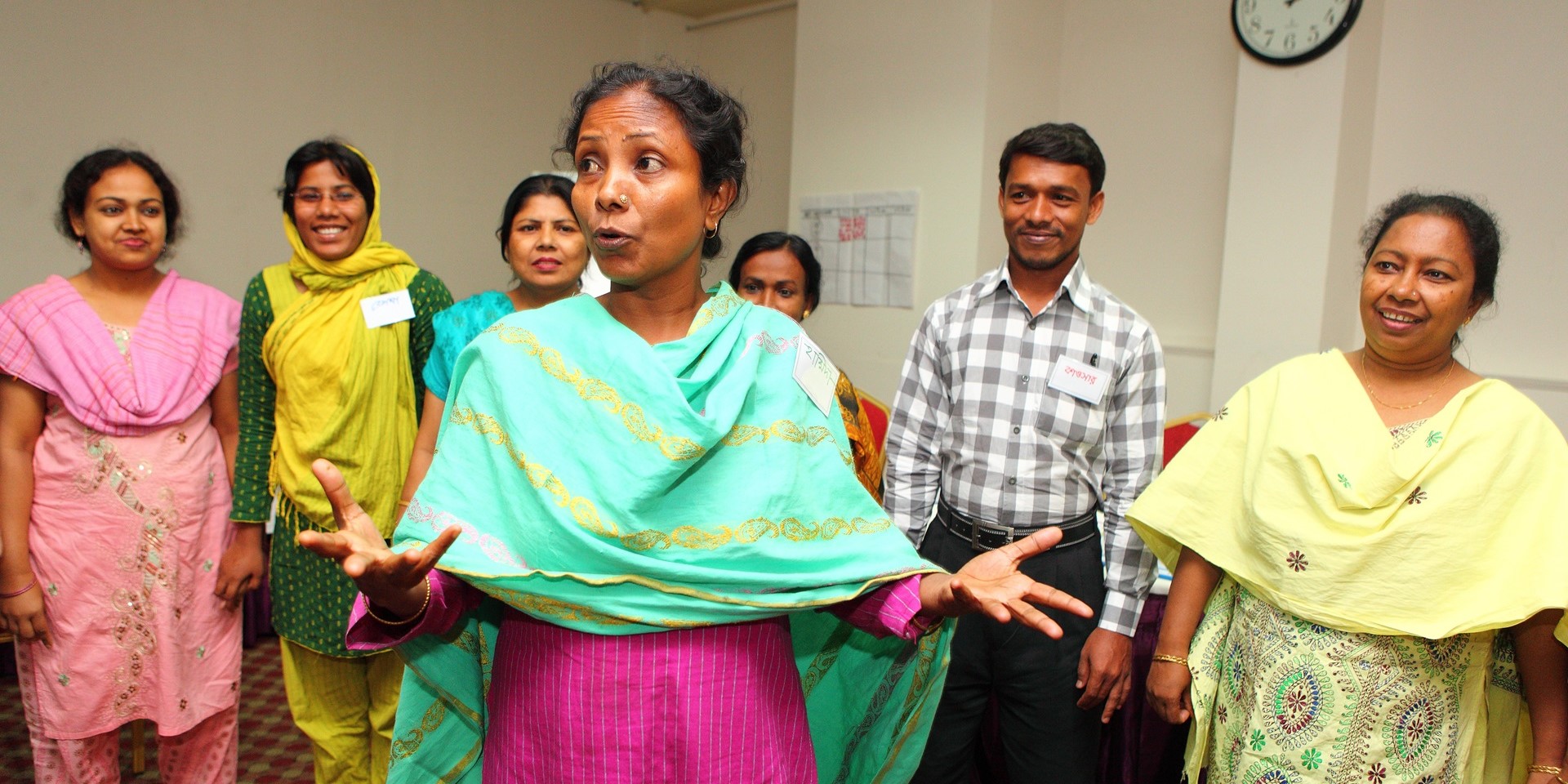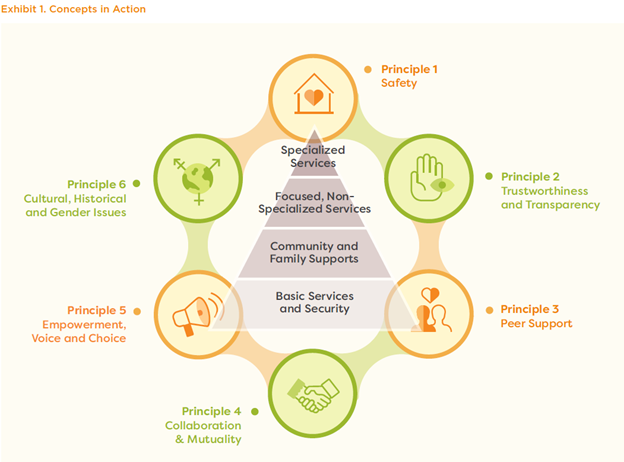
Navigating the Global Mental Health Crisis: Using Trauma-Informed Approaches for Development Practitioners
December 14, 2023 | 5 Minute ReadChemonics International’s Trauma-Informed Approaches Toolkit acknowledges the pervasive effects of trauma and equips professionals with the knowledge, tools, and strategies necessary to create more sustainable, equitable, and impactful development initiatives.
International development actors and projects working globally have a responsibility to understand and mitigate the potential of unintended harm that activities may cause or exacerbate. As the critical global shift towards mainstreaming mental health interventions increases, transformative and accessible methodologies such as the use of Trauma-Informed Approaches become more essential. Chemonics recognizes this urgency, and offers a practical solution – the Trauma-Informed Approaches Toolkit for International Development Practitioners (TIA Toolkit).
The Urgent Mental Health Crisis
The United Nations has long championed mental health as a universal human right, yet this does not always receive the attention it warrants and is often overshadowed. Left unaddressed, the neglect of mental health and impacts of traumatic experiences can lead to more severe mental health concerns that have lifelong ripple effects throughout a community. With nearly 70% of adults experiencing at least one traumatic event in their lifetime, this figure emphasizes the need for a global approach to address trauma and increase resilience.
International development projects frequently operate in contexts linked to trauma-affected populations, necessitating a commitment to trauma-informed practices to prevent unintended harm such as re-traumatization. The TIA Toolkit, with its 28 unique tools and nearly 100 recommended activities, provides essential guidance to adopt trauma-informed programming at any stage, for any practitioner, in any sector.
Defining and Taking a Combined Approach
“A trauma-informed approach to international development recognizes and addresses the potential for trauma and its effects on individuals and communities within development programs, ensuring that interventions are sensitive and responsive to any potentially existing trauma. [It] begins with understanding foundational principles to guide trauma-informed behaviors that are applied across a range of activities — from basic to specialized — throughout the project life cycle.” – TIA Toolkit, page 16
Chemonics’ approach to being more trauma-informed is a combination of two core, recognized concepts, namely the Substance Abuse and Mental Health Services Administration (SAMHSA) principles of Trauma-Informed Care, with a guiding activity framework for mental health service provision, and the Inter-Agency Standing Committee’s Mental Health and Psychosocial Support (IASC MHPSS) Intervention Pyramid.
The combined approach is underpinned by SAMHSA’s six Trauma-Informed Care principles, which are: 1) Safety, 2) Trustworthiness and Transparency, 3) Peer Support, 4) Collaboration and Mutuality, 5) Empowerment, Voice and Choice, and 6) Cultural, Historical and Gender Issues.
Complementing these principles, the IASC’s MHPSS Intervention Pyramid offers a practical framework and minimum standards to guide mental health activities by level of intervention and specialization, ranging from Tier 1) Basic services and security, 2) Community and family supports, 3) Focused, non-specialized services, and 4) Specialized services. This combination of the principles and framework present a holistic TIA, that can be applied at any stage in the project lifecycle.

Putting it into Practice
Being trauma-informed is a holistic approach, applicable to all sectors, skill levels, and stages of the project lifecycle. The TIA Toolkit offers valuable recommendations and tools for each stage:
Assessment
Being trauma-informed at the assessment stage means truly understanding and considering the project’s context with a trauma-sensitive lens. This is done by closely collaborating with local communities and experts and acknowledging historical trauma and identity-related threats. Being trauma-informed at this early stage can yield far better outcomes and prevent harm during the subsequent stages of programming. The toolkit provides tools such as a guide for conducting an 11-step trauma analysis, and a trauma-informed risk assessment template.
Design
Well-curated and appropriately designed programmatic activities can make or break a project’s success, and more importantly, can prevent harm or re-traumatization through poorly designed activities. To embed TIA, co-design activities with genuine collaboration, mutuality, empowerment, voice, and choice at the forefront. The toolkit outlines activities and tools, including a pocket guide for design using strengths-based approaches, a TIA Tipsheet for trauma-informed activities, and trauma-sensitive cost and budgeting resources.
Implementation
The implementation stage of a program is the longest, and mainstreaming TIA can lead to sustainable and positive well-being practices for all stakeholders. TIA promotes an environment of emotional safety and well-being through trauma-informed communication and transparency. Activities include the creation of safe spaces, investing in community-led initiatives, and enforcing TIA or safeguarding policies for the project. The toolkit includes a sample TIA organizational policy and code of conduct, as well as a 10-step checklist for creating a safe space.
Monitoring, Evaluation, and Learning (MEL)
Establishing and applying trauma-sensitive MEL methodologies can be an essential step in safeguarding communities and staff from harm. MEL processes necessitate close engagement with communities, meaning it is essential to establish trauma-informed MEL protocols, emphasizing safety, transparency, empowerment, and collaboration. The toolkit guides MEL staff training and provides tools for trauma-informed data interpretation, referrals, and learning agenda questions.
Staff Care and Engagement
International development staff can often be exposed to vicarious trauma, work under high levels of stress or distress, or be part of identity groups that may be exposed to harm or exclusion. Prioritizing trauma-informed care for staff can help strengthen resilience and mitigate harm. The toolkit offers recommendations for leadership commitments and organizational culture and provides tools for self-care.
TIA in action: Looking at the Western Balkans Rule of Law Initiative
Chemonics UK’s Western Balkans Rule of Law Initiative (WBROLI) exemplifies the positive outcomes of a TIA at all project stages. Funded by the UK Conflict, Stability and Security Fund, the project embedded trauma-informed management from inception, emphasizing survivor-centeredness and the ‘Do No Harm’ principle.
Key project successes, particularly in challenging harmful gender stereotypes in Montenegro, stem from locally led, survivor-friendly solutions that are co-designed and co-implemented. Emphasizing a survivor-centered approach, the project focuses on shifting attitudes and behaviors within the rule of law sector, especially as it relates to gender-based violence (GBV), through inclusive design processes, collaborative implementation, multi-lingual communication practices, and transparent resource dissemination.
WBROLI’s innovative MEL approach for using ‘what works’ utilizes a combination of interviews, virtual workshops, literature reviews, and a large conference, generating community-led insights into how implementation can be strengthened. Trauma-informed training ensures beneficiary staff apply empathetic approaches during all interactions with GBV survivors, empowering their voices and preventing unintended harm. Peer support and transparent dialogue with all stakeholders inform on-the-job training needs, aligning with SAMHSA principles and fostering empowerment, voice, choice, peer support, and trust.
In cultivating an environment of continuous learning and collaboration, WBROLI serves as a testament to the transformative impact of trauma-informed approaches in international development, and integrating more trauma-informed engagement within institutions. As a result of these measures, WBROLI has meaningfully improved the experiences for GBV survivors, who are less stigmatized and have more positive engagement within the legal court system.
Recognizing mental health as a universal human right, our duty of care as international development practitioners extends to preventing unintended harm and re-traumatization, and maximizing well-being through trauma-informed programming. The TIA Toolkit enables development practitioners to navigate this global shift towards prioritizing mental health interventions in any context and sector.
Banner image caption: Clinic staff practice facilitating group meetings during a Surjer Hashi Health Group training session. Photo supplied by the USAID Bangladesh Smiling Sun Franchise Program.
Posts on the blog represent the views of the authors and do not necessarily represent the views of Chemonics.













